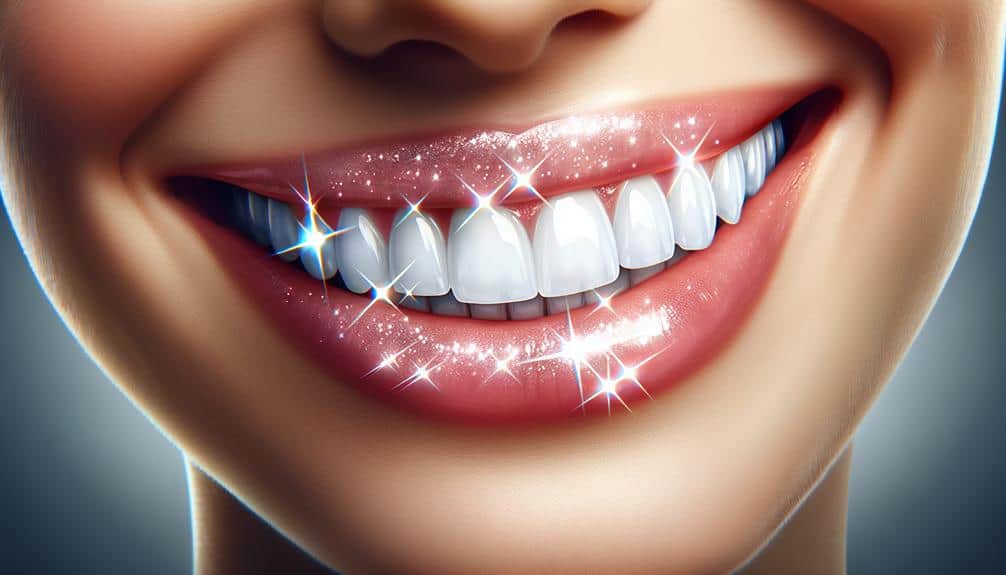Charcoal teeth whitening is effective for discoloration because of its unique adsorption process that efficiently removes impurities from the enamel surface. The charcoal particles bind to the enamel and trap stain-causing molecules, making it a popular choice for those wanting a natural and chemical-free way to enhance their smile. Its abrasive nature also aids in scrubbing away surface stains, providing gradual whitening with consistent use. For more in-depth insights into the benefits, safety tips, and results of charcoal whitening, there's a wealth of information available.
Key Points
- Charcoal's adsorption process traps stain-causing molecules effectively.
- Its abrasive nature aids in scrubbing away surface stains.
- Contains natural ingredients, appealing to those seeking chemical-free options.
- Long-term effectiveness with consistent use for lasting results.
- Potentially gentler on teeth and gums compared to traditional whitening methods.
How Charcoal Whitens Discolored Teeth
To understand how charcoal whitens discolored teeth, it's essential to grasp the adsorption process it undergoes when in contact with stains on the enamel surface. Charcoal, in the form of activated charcoal powder or charcoal-infused toothpaste, works through a process called adsorption, where molecules and ions from the stains adhere to the surface of the charcoal. This adsorption process is highly effective in pulling out impurities, including those causing discoloration, from the enamel of the teeth.
The charcoal process involves the activated charcoal particles in the toothpaste or powder binding to the surface of the enamel, attracting and trapping the stain-causing molecules. This process is particularly beneficial for removing stains caused by coffee, tea, wine, and other pigmented foods. The abrasive nature of charcoal also aids in gently scrubbing away surface stains, contributing to the overall stain removal effectiveness. By adhering to the stains and pulling them away during rinsing, charcoal helps in achieving a brighter and whiter smile through its stain removal capabilities.
Benefits of Charcoal Teeth Whitening
Charcoal teeth whitening offers a range of benefits beyond just removing surface stains, contributing to a brighter and whiter smile. One significant advantage is its long-term effectiveness. Unlike some traditional whitening methods that may fade quickly, charcoal whitening can provide lasting results. The activated charcoal works to lift deep-seated stains, resulting in a more thorough whitening effect that endures over time.
Another key benefit of charcoal teeth whitening is the use of natural ingredients. Many charcoal whitening products contain natural ingredients such as activated charcoal derived from coconut shells or other organic sources. This natural approach appeals to individuals seeking more holistic and chemical-free teeth whitening options. Additionally, the absence of harsh chemicals in charcoal whitening products may be gentler on the teeth and gums, making it a potentially safer choice for those with sensitive oral tissues.
Incorporating charcoal teeth whitening into your oral care routine can't only enhance the brightness of your smile but also provide long-lasting results and a natural approach to teeth whitening.
Safety Tips for DIY Charcoal Whitening
For safe and effective DIY charcoal whitening, it's crucial to adhere to recommended guidelines and precautions to safeguard your oral health.
When using charcoal for teeth whitening, consider the following safety tips:
- Ingredient Safety: Make sure the charcoal used is activated charcoal specifically designed for dental use to avoid harmful abrasives.
- Application Technique: Gently brush the charcoal onto your teeth in a circular motion using a soft toothbrush to prevent enamel damage.
- Frequency: Restrict charcoal whitening to 2-3 times a week to prevent excessive abrasion on teeth.
- Rinsing: Thoroughly rinse your mouth after charcoal whitening to eliminate any residue that could potentially harm your gums.
- Consultation: If you have sensitive teeth or existing dental issues, consult with a dentist before starting charcoal whitening to ensure it's safe for you.
Charcoal Vs. Traditional Whitening Methods
When considering teeth whitening methods, it's essential to compare the effectiveness and safety of charcoal whitening against traditional whitening techniques. Charcoal effectiveness in whitening teeth primarily stems from its ability to adsorb surface stains and toxins due to its porous nature. However, it's important to note that the abrasive nature of charcoal may not be suitable for everyone, as it can potentially wear down enamel over time if not used cautiously.
On the other hand, traditional whitening methods such as hydrogen peroxide-based products or professional dental treatments work by bleaching the teeth to break apart stains and lighten the overall color. These methods are often more controlled in their application and have been extensively studied for their efficacy and safety.
While charcoal may offer a natural alternative for teeth whitening, traditional methods backed by scientific research and dental professionals provide a more predictable and safer route for achieving a brighter smile. It's recommended to consult with a dentist before choosing a whitening method to ensure it suits your individual needs and oral health.
Results to Expect From Charcoal Whitening
Comparing the expected outcomes of charcoal whitening to traditional methods can help you gauge the effectiveness and potential results of this natural alternative. When using charcoal for teeth whitening, it's essential to understand the results you can anticipate. Here's what you can expect:
- Gradual Whitening: Charcoal whitening may show results after a few uses, but best whitening may take time.
- Stain Removal: Charcoal is effective at removing surface stains, giving the appearance of whiter teeth.
- Long Term Effectiveness: Consistent use of charcoal products can lead to sustained whitening effects over time.
- Gentle Whitening: Charcoal is known for its gentle approach to whitening, making it suitable for those with sensitive teeth.
- Common Misconceptions: Contrary to some beliefs, charcoal whitening can be safe and effective if used correctly.
Understanding these aspects can help you set realistic expectations and achieve the desired results from charcoal teeth whitening.
Frequently Asked Questions
Can Charcoal Teeth Whitening Be Used by Individuals With Sensitive Teeth or Gums?
If you have sensitive teeth or gums, charcoal teeth whitening can provide sensitivity relief while delivering whitening results. It's essential for gum health and safe to use when following instructions carefully.
Is There a Risk of Damaging Tooth Enamel With Frequent Charcoal Teeth Whitening Treatments?
Using charcoal teeth whitening frequently can pose risks to enamel protection. Sensitivity concerns may arise due to its abrasive nature. Prioritize gum health and consult with a dental professional to guarantee whitening safety and prevent potential damage.
Are There Any Specific Foods or Drinks That Should Be Avoided After a Charcoal Whitening Treatment?
After a charcoal whitening treatment, focus on staining prevention by avoiding foods and drinks like coffee, tea, red wine, and berries. These post-treatment dietary restrictions can help maintain your oral care and the whitening effects.
Can Charcoal Teeth Whitening Be Used on Dental Restorations Such as Crowns or Veneers?
When using charcoal teeth whitening on dental restorations, like crowns or veneers, take precautions to avoid damage. Charcoal may be abrasive and affect the appearance of these restorations. Consider safer alternatives for whitening to protect your dental work.
Are There Any Potential Long-Term Effects of Using Charcoal for Teeth Whitening?
When considering charcoal teeth whitening, be cautious of potential long-term health concerns. Explore alternative methods for a safer approach. Follow safety precautions and understand the risks associated with charcoal whitening to protect your oral health.
Conclusion
To sum up, charcoal teeth whitening is effective for discoloration because it absorbs stains and toxins from the teeth, leaving them looking brighter and whiter.
This natural method is like a gentle yet powerful eraser for your smile, helping to remove stubborn stains and reveal a more radiant appearance.
Remember to follow safety tips and consult with a dentist before starting any whitening treatment for the best results.



